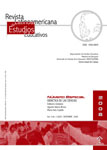Authors
Abstract
This study presents the results of a research whose purspos was to consider the meaning of the university students’ reflections who participated in an interprofessional education (IE) course from different health science careers (Universidad de Uruguay, Montevideo, Uruguay), in a context of problem-based learning (PBL). The methodology included an ethnographic study; data analysis was also performed interpretatively. The results led to addressing learning from a socio-cultural collaborative point of view that can influence the construction of significant knowledge in dynamic and complex social contexts. The text argues that interprofessional education promotes early socialization of students from the related professions and provides opportunities for the development of a collective intelligence with the potential to improve learning and professional performance.
References
________. (2002). Adquisición y retención del conocimiento. Una perspectiva cognitiva. Barcelona: Paidós.
Bleakley, A. (2006). “Broadening conceptions of learning in medical education: the message from teamworking”. Medical Education, 40: 150-157.
Boud, D.; Feletti, G.I. (1997). The challenge of problem based learning. Londres: Kogan Page.
Carretero, M. (1999). Constructivismo y educación. México: Progreso.
Copello, M.I. (2005). ″“Diarios” y “artículo” en la práctica docente del profesor/a de biología. Enseñanza de las Ciencias″. Número extra. VII Congreso Internacional sobre Investigación en la Didáctica de las Ciencias. [Accedido: 27 julio, 2007]. Disponible en: http://ensciencias.uab.es/webblues/www/congres2005/material/comuni_orales/3_Relacion_invest/3_3/copello_794.pdf
Engestrom, Y. (1987). Learning by expanding: an activity-theoretical approach to developmental research. Helsinki: Orienta-Konsultit Oy.
García Gandía, J.M; Greca, I.M y Meneses Villagra, J.A. (2005). “Las comunidades virtuales de práctica para el desarrollo profesional docente en enseñanza de las ciencias. Enseñanza de las Ciencias”. Número extra. VII Congreso Internacional sobre Investigación en la Didáctica de las Ciencias. [Accedido: 27 julio, 2007]. Disponible en: http://ensciencias.uab.es/webblues/www/congres2005/material/comuni_orales/3_Relacion_invest/3_3/Garcia_Gandia_556.pdf
Goetz, J.P.; Le Comte, M. (1988). Etnografía y diseño cualitativo en investigación educativa. Madrid: Morata.
Harden, R.M. (1998). “Effective multiprofessional education: a three-dimensional perspective”. Medical Teacher, 20: 402-408.
Iglesias, J. (2002). “El aprendizaje basado en problemas en la formación inicial de docentes”. Perspectivas, vol. XXXII, nº 3. [Accedido: 27 julio, 2007]. Disponible en: www.usal.es/~ofeees/NUEVAS_METODOLOGIAS/ABP/igless%5B1%5D.pdf
Middleton, D. (1998). Talking work: argument, common knowledge, and improvisation in teamwork. In: Engelstrom, Y., Middleton, D., (Eds.). Cognition and Communication at Work. Cambridge: Cambridge University Press. pp. 233-256.
Miguez, M.; Curione, C. (2005). Aprendizaje de las Ciencias. Montevideo: Unidad de Enseñanza, Facultad de Ingeniería, Universidad de la República.
Orellana, I. (2002). “La estrategia pedagógica de la comunidad de aprendizaje, definiendo sus fundamentos, sus prácticas y su pertinencia en educación ambiental”. In: Sauvé, L., Orellana, I., y Sato, M. Textos escogidos en educación ambiental, de una América a la otra, Tomo 2. ERE-UQAM, Université du Québec, Montreal.
Rodríguez Palmero, M.L. (2004). “La teoría del aprendizaje significativo”. In: A.J. Cañas; J.D. Novak, F.M. González, (Eds.). Concept Maps: Theory, Methodology, Technology. Proc. of the First Int. Conference on Concept Mapping. Pamplona, España.
Rozman, C. (1997). “La educación médica en el umbral del siglo XXI”. Med Clin (Barc), 108: 582-586.
Sfard, A. (1998). “On two metaphors for learning and on the danger of choosing just one”. Educational Res, 27: 4-13.
Vygotsky, L.S. (1985). Pensamiento y lenguaje. Buenos Aires: Pléyade.
Wenger, E. (1998). Communities of practice: Learning, Meaning and Identity. Cambridge: Cambridge University Press.

 PDF (Español)
PDF (Español)
 FLIP
FLIP




















